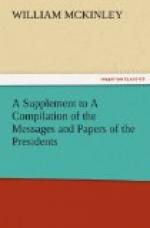the 2d of July, 1890. The provisions of this
statute are comprehensive and stringent. It declares
every contract or combination, in the form of a trust
or otherwise, or conspiracy in the restraint of trade
or commerce among the several States or with foreign
nations, to be unlawful. It denominates as a
criminal every person who makes any such contract or
engages in any such combination or conspiracy, and
provides a punishment by fine or imprisonment.
It invests the several circuit courts of the United
States with jurisdiction to prevent and restrain violations
of the act, and makes it the duty of the several United
States district attorneys, under the direction of
the Attorney-General, to institute proceedings in
equity to prevent and restrain such violations.
It further confers upon any person who shall be injured
in his business or property by any other person or
corporation by reason of anything forbidden or declared
to be unlawful by the act, the power to sue therefor
in any circuit court of the United States without
respect to the amount in controversy, and to recover
threefold the damages by him sustained and the costs
of the suit, including reasonable attorney fees.
It will be perceived that the act is aimed at every
kind of combination in the nature of a trust or monopoly
in restraint of interstate or international commerce.
The prosecution by the United States of offenses under the act of 1890 has been frequently resorted to in the Federal courts, and notable efforts in the restraint of interstate commerce, such as the Trans-Missouri Freight Association and the Joint Traffic Association, have been successfully opposed and suppressed.
President Cleveland in his annual message of December 7, 1896—more than six years subsequent to the enactment of this law—after stating the evils of these trust combinations, says:
Though Congress has attempted to deal with this matter by legislation, the laws passed for that purpose thus far have proved ineffective, not because of any lack of disposition or attempt to enforce them, but simply because the laws themselves as interpreted by the courts do not reach the difficulty. If the insufficiencies of existing laws can be remedied by further legislation, it should be done. The fact must be recognized, however, that all Federal legislation on this subject may fall short of its purpose because of inherent obstacles, and also because of the complex character of our governmental system, which, while making the Federal authority supreme within its sphere, has carefully limited that sphere by metes and bounds which cannot be transgressed. The decision of our highest court on this precise question renders it quite doubtful whether the evils of trusts and monopolies can be adequately treated through Federal action, unless they seek directly and purposely to include in their objects transportation or intercourse between States or between the United States and foreign




